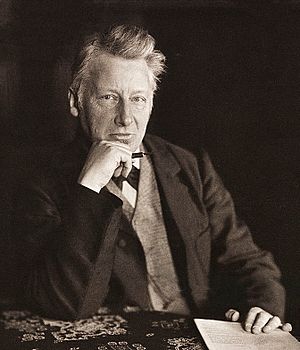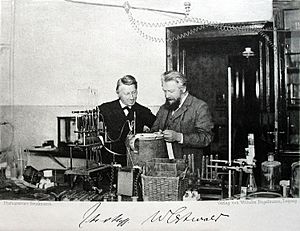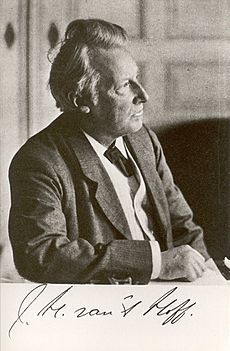Jacobus Henricus van 't Hoff facts for kids
Quick facts for kids
Jacobus Henricus van 't Hoff Jr.
|
|
|---|---|

Van 't Hoff by Nicola Perscheid in 1904
|
|
| Born | 30 August 1852 Rotterdam, Netherlands
|
| Died | 1 March 1911 (aged 58) Steglitz, Berlin, German Empire
|
| Nationality | Dutch |
| Alma mater | |
| Known for |
|
| Awards |
|
| Scientific career | |
| Fields | Physical chemistry Organic chemistry Theoretical chemistry |
| Institutions |
|
| Doctoral advisor | Eduard Mulder |
| Doctoral students | Ernst Cohen |
| Other notable students | Frederick G. Donnan |
Jacobus Henricus van 't Hoff (born August 30, 1852 – died March 1, 1911) was a famous Dutch chemist. He is known as a very important theoretical chemist. He was also the very first person to win the Nobel Prize in Chemistry!
Jacobus helped create the field of physical chemistry. Many people think he was one of the greatest chemists ever.
Contents
Biography of Jacobus van 't Hoff
Jacobus van 't Hoff was born in Rotterdam, Netherlands, on August 30, 1852. His father, Jacobus Henricus van 't Hoff Sr., was a doctor. His mother was Alida Kolff van 't Hoff.
From a young age, Jacobus loved science and nature. He often went on trips to study plants. When he was in school, he was very interested in poetry and philosophy. He looked up to the poet Lord Byron.
Jacobus decided to study chemistry, even though his father wanted him to do something else. In September 1869, he started studying at Delft University of Technology. He finished his studies there in just two years, even though it was supposed to take three. He earned a degree in chemical technology.
After that, he studied chemistry at the University of Leiden. He also studied in Bonn, Germany, with August Kekulé. Later, he studied in Paris with Adolphe Wurtz. He earned his doctorate (a very high degree) from the University of Utrecht in 1874. His advisor was Eduard Mulder.
In 1878, van 't Hoff married Johanna Francina Mees. They had two daughters, Johanna Francina and Aleida Jacoba. They also had two sons, Jacobus Henricus van 't Hoff III and Govert Jacob. Jacobus van 't Hoff died on March 1, 1911, when he was 58 years old. He passed away in Steglitz, near Berlin, from a lung disease called tuberculosis.
Van 't Hoff's Career and Discoveries
In 1887, Jacobus van 't Hoff and a German chemist named Wilhelm Ostwald started an important science magazine. It was called Zeitschrift für physikalische Chemie, which means "Journal of Physical Chemistry".
In 1896, van 't Hoff became a professor at the Prussian Academy of Sciences in Berlin. He studied salt deposits in a place called Stassfurt. This work was very helpful for Germany's chemical industry.

Van 't Hoff also taught chemistry and physics at the Veterinary College in Utrecht. Then, he became a professor at the University of Amsterdam. He taught chemistry, mineralogy (the study of minerals), and geology (the study of Earth) for almost 18 years. He even became the head of the chemistry department there.
In 1896, van 't Hoff moved to Germany. He finished his career at the University of Berlin in 1911. In 1901, he received the first-ever Nobel Prize in Chemistry. He won it for his important work on how chemicals behave in solutions.
His main research helped us understand many things. These include chemical kinetics (how fast chemical reactions happen), chemical equilibrium (when reactions balance out), osmotic pressure (how liquids move through membranes), and crystallography (the study of crystals).
Honors and Awards
Jacobus van 't Hoff received many awards and honors for his amazing work.
- In 1885, he became a member of the Royal Netherlands Academy of Arts and Sciences.
- In 1904, he was chosen as a member of the American Philosophical Society.
- He received special honorary degrees from famous universities like Harvard and Yale (in 1901). He also got them from Victoria University, the University of Manchester (in 1903), and University of Heidelberg (in 1908).
- In 1893, he was given the Davy Medal by the Royal Society. He shared this award with Le Bel.
- In 1897, he was elected as a Foreign Member of the Royal Society (ForMemRS).
- He received the Helmholtz Medal in 1911 from the Prussian Academy of Sciences.
- He was made a Knight of the French Legion of Honour in 1894.
- He became an Honorary Member of many chemical societies around the world. These included the British Chemical Society in London, the Royal Netherlands Academy of Arts and Sciences (1892), American Chemical Society (1898), the Académie des Sciences in Paris (1905), and the Netherlands Chemical Society (1908).
Of all his awards, van 't Hoff felt that winning the first Nobel Prize in Chemistry was the biggest achievement of his career.
Some important things in chemistry are named after him:
- Van 't Hoff factor
- Van 't Hoff equation
- Le Bel–Van 't Hoff rule
On May 14, 2021, a small space rock called asteroid 34978 van 't Hoff was named in his memory. Astronomers found it in 1977.
See also
 In Spanish: Jacobus Henricus van 't Hoff para niños
In Spanish: Jacobus Henricus van 't Hoff para niños
 | George Robert Carruthers |
 | Patricia Bath |
 | Jan Ernst Matzeliger |
 | Alexander Miles |


